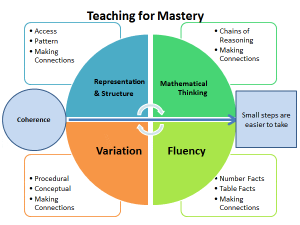Mastering Maths means pupils of all ages acquire a deep, long-term, secure, and adaptable understanding of the subject. The phrase “teaching for mastery” describes the elements of classroom practice and school organisation that combine to give pupils the best chances of mastering maths (NCETM).
At Rye, we believe that the Mastery of Maths is achievable for all. We deliver a creative curriculum where children engage in fluency activities, are exposed to concepts through a range of different representations, including the use of physical manipulatives, and are given the opportunity to use their problem-solving and reasoning skills through a variety of mathematical concepts.
We aim that all pupils:
- Become fluent in the fundamentals of mathematics through varied and frequent practice with increasingly complex problems over time so that pupils develop conceptual understanding and the ability to recall and apply knowledge rapidly and accurately.
- Solve problems by applying their mathematics to a variety of problems with increasing sophistication including breaking them down into a series of simpler steps and persevering in seeking solutions.
- Reason mathematically by following a line of enquiry, conjecturing relationships and generalisations and developing an argument, justification, or proof using correct mathematical language and vocabulary
Our teaching for mastery is underpinned by the NCETM’s 5 Big Ideas

- Coherence: Lessons are broken down into small, connected steps that gradually unfold the concept.
- Representation and Structure: Concepts are explored using concrete, pictorial, & abstract representations, encouraging children to actively look for patterns.
- Mathematical Thinking: Children make chains of reasoning connected to other areas of Maths. Concepts are worked on by the student; they are thought about, reasoned with, and discussed with others.
- Fluency: Children can make quick and efficient recalls of number and times table facts.
- Variation: It highlights the essential features of a concept or idea by varying the non-essential features.





